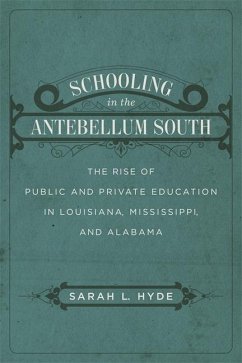In Schooling in the Antebellum South, Sarah L. Hyde analyzes educational development in the Gulf South before the Civil War, not only revealing a thriving private and public education system, but also offering insight into the worldview and aspirations of the people inhabiting the region. While historians have tended to emphasize that much of the antebellum South had no public school system and offered education only to elites in private institutions, Hyde's work suggests a different pattern of development in Louisiana, Mississippi, and Alabama, where citizens actually worked to extend schooling across the region. As a result, students learned in a variety of settings--in their own homes with a family member or hired tutor, at private or parochial schools, and in public free schools. Regardless of the venue, Hyde shows that the ubiquity of learning in the region proves how highly southerners valued education. > The return of prosperity, Hyde suggests, coincided with the maturation of Jacksonian democracy--a political philosophy that led southerners to demand access to privileges formerly reserved for the elite, including schooling. Hyde explains that while Jacksonian ideology inspired voters to lobby for schools, the value southerners placed on learning was rooted in republicanism: they believed a representative democracy needed an educated populace to survive. Consequently, by 1860 all three states had established statewide public school systems. Schooling in the Antebellum South successfully challenges the conventional wisdom that an elitist educational system prevailed in the South and adds historical depth to an understanding of the value placed on public schooling in the region.








